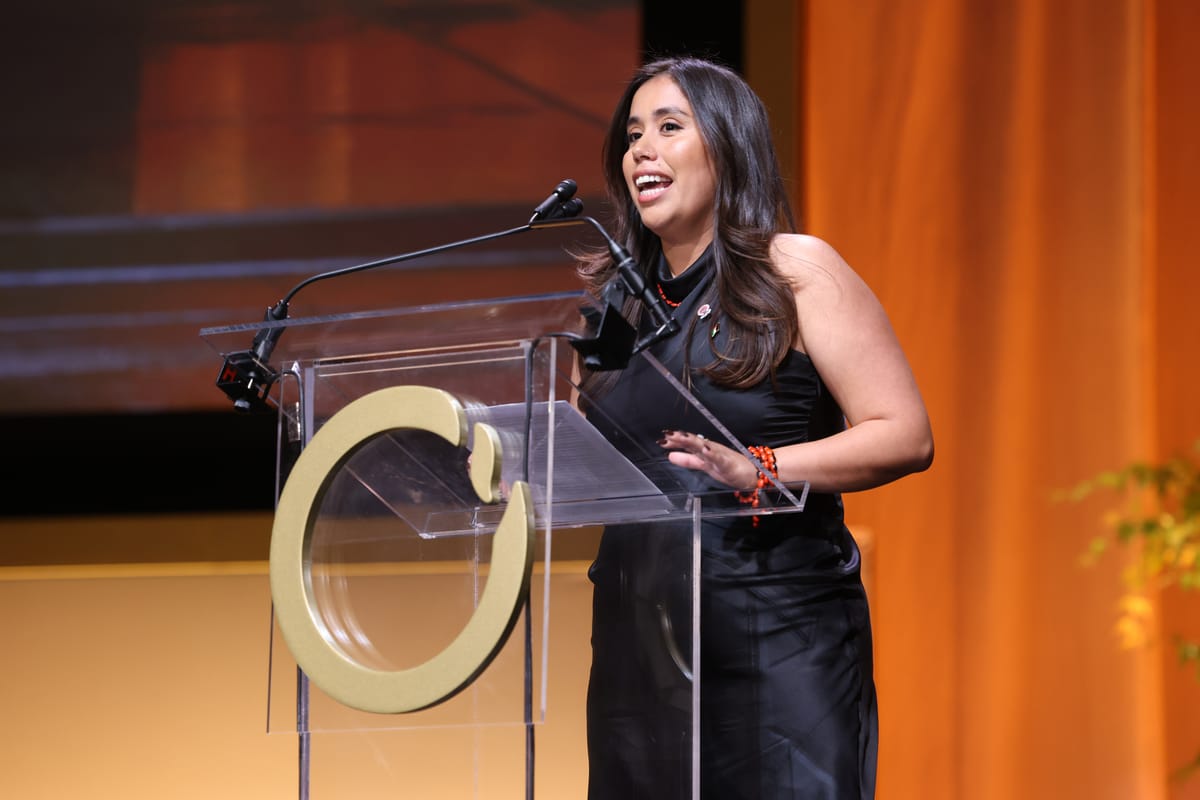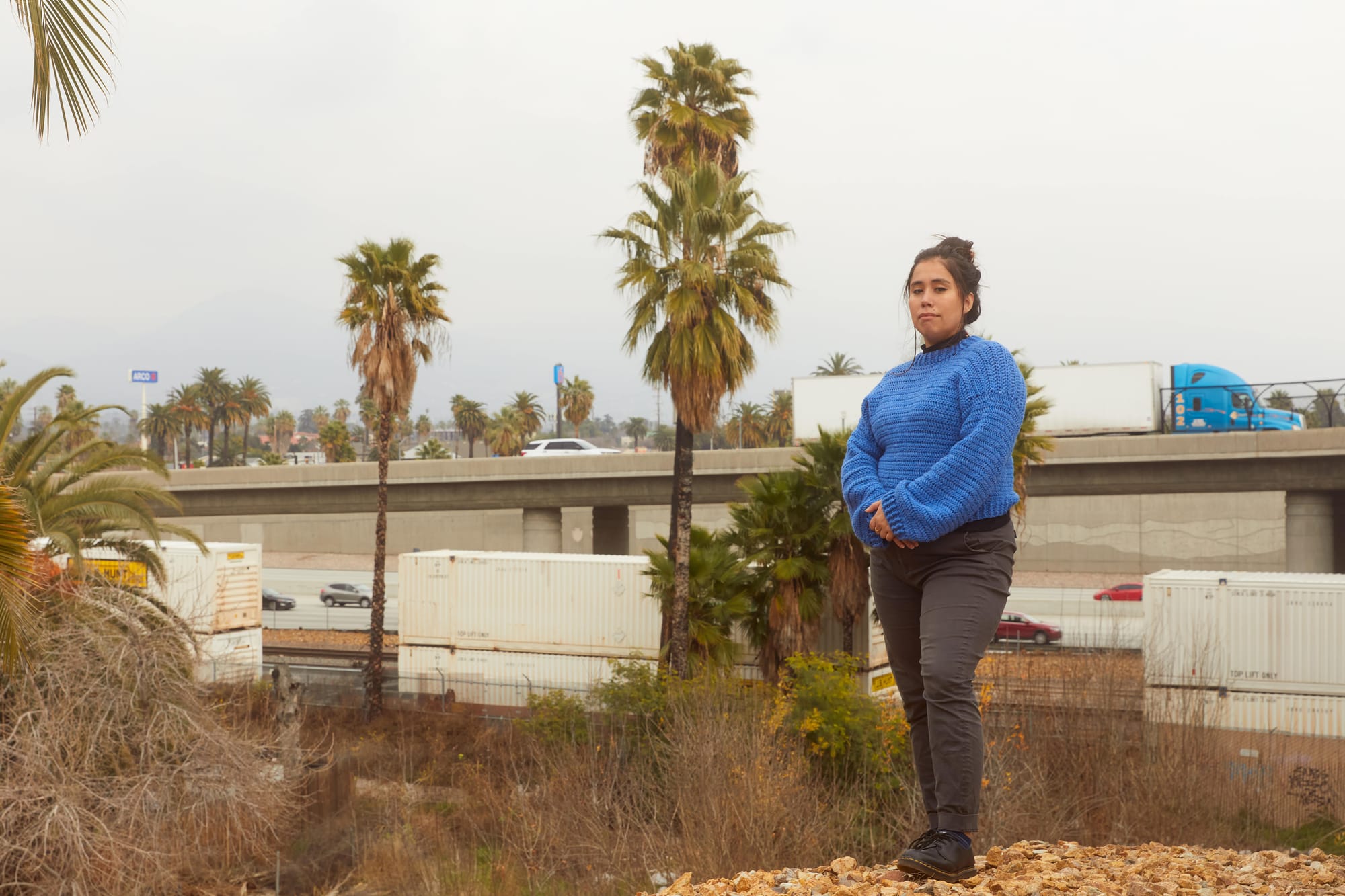Championing environmental justice: Andrea Vidaurre of PC4EJ receives prestigious Goldman Environmental Prize, sheds light on the Inland Empire's movement

On Monday, Andrea Vidaurre with the People’s Collective for Environmental Justice (PC4EJ) was honored as North America’s Goldman Environmental Prize award winner. The Goldman Environmental Prize honors the achievements and leadership of grassroots environmental activists from around the world.
Vidaurre took some time Thursday to speak to The Frontline Observer about what the award means for her and PC4EJ.
How are you feeling about receiving this prestigious award?
I'm feeling honored to be able to represent the Inland Empire. I feel like this is a really good platform for us to show the struggle we're in. People don't really think about how they get their items [through shipping] so it feels good to be able to expose that. It also just feels great to show the creativity that's happening in the IE and all the good work people are doing in their communities.
Why is it important for people around the US and world to know about what’s going on here in the Inland Empire with warehousing and logistics?
It’s important for us to expose this because we're not connecting how our shopping habits and consumer habits are connected to climate change. And so this award is really about connecting with other grassroots leaders worldwide to address climate change.
This work is hard to ignore. A lot of us are growing up and living and working in the region. Our environments have changed drastically over the last five to 10 years. Truck traffic, especially, has grown so much that the quality of our air has worsened. People are connecting more with how their health is being impacted by the poor air quality. We're losing green spaces, we're losing homes and we’re losing schools to this industry.
Some folks who have been a little bit more tapped in are really starting to connect the dots about how the train that's driving by their neighborhood or truck routes are contributing to the cancers that may already be prevalent in their family’s history. At the very core of this, I think it is about people's health, and making sure people are connecting that as well to their built environment.
Video Credit: Goldman Environmental Prize
During the award ceremony, you thanked various people, especially those who have come before your generation of advocates, and those who have passed away fighting air pollution. How is the fight for environmental justice linked with historical struggle?
This award is given to one person. But you know, there's always a whole community behind that one person. I wanted to make sure that I paid my dues to organization's like Impact Project and Moving Forward Network – groups that have been fighting against freight emissions for decades. They’ve built these organizations with great power that are now fighting for strong policies and suing the industry.
But I also dedicated the award to community members, because there are so many people in our communities that are part of this fight that maybe have not received the recognition. These are people who consistently go to council meetings and call shit out or who are part of parent groups that speak to other parents about the issues going on. There have been a lot of women in our communities, as you know, that have been the leaders in this movement who have worked to stop above ground gas tanks and push back against the expansion of the rail yards.
Historically, there were people that were basically calling out when the freeways were built. All of these current and historical infrastructure developments are what drives consumerism. Valley Truck Farms, which is a historic Black community by the San Bernardino Airport, were part of this environmental justice fight too. Perhaps they didn’t claim it or weren’t aware of the concept of EJ, but I think there's a lot of history that I'm hoping we can connect more on.

Tell us more about the People’s Collective for Environmental Justice and the work you do across the Inland Empire?
PC4EJ is a community based organization. We have a horizontal governance structure. We choose to not have an executive director. We're a team made up of local residents that either live here, were born here or work here. And we all have this vision of a better Inland Empire that actually nourishes our growth and helps us live the full, wonderful lives that we want.
And we know that as we're fighting for that, we have to fight against the environmental racism that we see in the IE. Our organization works with other community groups and grassroots neighborhood groups. And we've been successful in passing some great policies regionally and statewide and even nationally.
What’s ahead for you and PC4EJ in the Inland Empire’s fight for environmental justice?
I'm going to continue doing this work at PC4EJ. The work by no means is over. I think we have a responsibility as an organization to make sure the truck and train rules are implemented correctly and justly. We need to make sure that we are assisting the truck drivers in our community to be able to transition in a just way. I think there is a responsibility on us to make sure that these regulations are moving fast enough. We may have to go back to the California Air Resources Board (CARB) and ask for these rules to move faster. If we are seeing success in the next couple of years, I also think we have a big responsibility on ensuring that we are not just about a technology change, but we're actually doing the work to change our goods movement systems to be more efficient and more sustainable for all of us.
Last week, there was an announcement from the White House. There was a fact sheet that they released that said that they are committing to figure out a way to get 100% zero emissions in the freight sector. It doesn’t mean they have a plan yet, but there is a commitment in that direction, which is really important. That was the precursor to CARB’s Advanced Clean Truck and Clean Fleet rules. California’s state leadership said our state needed to go full zero, right. So the agencies are doing that. I think we're in a similar situation now where we have the White House giving this direction. So now it's about how do we actually get these plans to happen.
